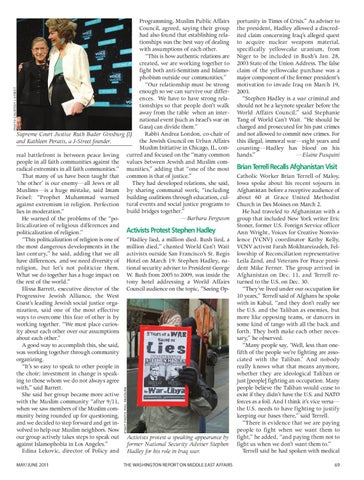Programming, Muslim Public Affairs Council, agreed, saying their group had also found that establishing relationships was the best way of dealing with assumptions of each other. “This is how authentic relations are created, we are working together to fight both anti-Semitism and Islamophobism outside our communities.” “Our relationship must be strong enough so we can survive our differences. We have to have strong relationships so that people don’t walk away from the table when an international event (such as Israel’s war on Gaza) can divide them.” Rabbi Andrea London, co-chair of Supreme Court Justice Ruth Bader Ginsburg (l) the Jewish Council on Urban Affairs and Kathleen Peratis, a J-Street founder. Muslim Initiative in Chicago, IL, conreal battlefront is between peace loving curred and focused on the “many common people in all faith communities against the values between Jewish and Muslim comradical extremists in all faith communities.” munities,” adding that “one of the most That many of us have been taught that common is that of justice.” They had developed relations, she said, ‘the other’ is our enemy—all Jews or all Muslims—is a huge mistake, said Imam by sharing communal work, “including Feisel: “Prophet Muhammad warned building coalitions through education, culagainst extremism in religion. Perfection tural events and social justice programs to build bridges together.” lies in moderation.” —Barbara Ferguson He warned of the problems of the “politicalization of religious differences and Activists Protest Stephen Hadley politicalization of religion.” “This politicalization of religion is one of “Hadley lied, a million died. Bush lied, a the most dangerous developments in the million died,” chanted World Can’t Wait last century,” he said, adding that we all activists outside San Francisco’s St. Regis have differences, and we need diversity of Hotel on March 19. Stephen Hadley, nareligion, but let’s not politicize them. tional security adviser to President George What we do together has a huge impact on W. Bush from 2005 to 2009, was inside the the rest of the world.” tony hotel addressing a World Affairs Elissa Barrett, executive director of the Council audience on the topic, “Seeing OpProgressive Jewish Alliance, the West Coast’s leading Jewish social justice organization, said one of the most effective ways to overcome this fear of other is by working together. “We must place curiosity about each other over our assumptions about each other.” A good way to accomplish this, she said, was working together through community organizing. “It’s so easy to speak to other people in the choir; investment in change is speaking to those whom we do not always agree with,” said Barrett. She said her group became more active with the Muslim community “after 9/11, when we saw members of the Muslim community being rounded up for questioning, and we decided to step forward and get involved to help our Muslim neighbors. Now our group actively takes steps to speak out Activists protest a speaking appearance by against Islamophobia in Los Angeles.” former National Security Adviser Stephen Edina Lekovic, director of Policy and Hadley for his role in Iraq war. STAFF PHOTO PHIL PASQUINI
PHOTO COURTESY J STREET
activisms_62-75_May/June 2011 Activisms 4/12/11 8:36 PM Page 69
MAY/JUNE 2011
THE WASHINGTON REPORT ON MIDDLE EAST AFFAIRS
portunity in Times of Crisis.” As adviser to the president, Hadley allowed a discredited claim concerning Iraq’s alleged quest to acquire nuclear weapons material, specifically yellowcake uranium, from Niger to be included in Bush’s Jan. 28, 2003 State of the Union Address. The false claim of the yellowcake purchase was a major component of the former president’s motivation to invade Iraq on March 19, 2003. “Stephen Hadley is a war criminal and should not be a keynote speaker before the World Affairs Council,” said Stephanie Tang of World Can’t Wait. “He should be charged and prosecuted for his past crimes and not allowed to commit new crimes. For this illegal, immoral war—eight years and counting—Hadley has blood on his hands.” —Elaine Pasquini
Brian Terrell Recalls Afghanistan Visit Catholic Worker Brian Terrell of Maloy, Iowa spoke about his recent sojourn in Afghanistan before a receptive audience of about 60 at Grace United Methodist Church in Des Moines on March 2. He had traveled to Afghanistan with a group that included New York writer Eric Stoner, former U.S. Foreign Service officer Ann Wright, Voices for Creative Nonviolence (VCNV) coordinator Kathy Kelly, VCNV activist Farah Mokhtareizadeh, Fellowship of Reconciliation representative Leila Zand, and Veterans For Peace president Mike Ferner. The group arrived in Afghanistan on Dec. 11, and Terrell returned to the U.S. on Dec. 30. “They’ve lived under our occupation for 10 years,” Terrell said of Afghans he spoke with in Kabul, “and they don’t really see the U.S. and the Taliban as enemies, but more like opposing teams, or dancers in some kind of tango with all the back and forth. They both make each other necessary,” he observed. “Many people say, ‘Well, less than onefifth of the people we’re fighting are associated with the Taliban.’ And nobody really knows what that means anymore, whether they are ideological Taliban or just [people] fighting an occupation. Many people believe the Taliban would cease to exist if they didn’t have the U.S. and NATO forces as a foil. And I think it’s vice versa— the U.S. needs to have fighting to justify keeping our bases there,” said Terrell. “There is evidence that we are paying people to fight when we want them to fight,” he added, “and paying them not to fight us when we don’t want them to.” Terrell said he had spoken with medical 69
